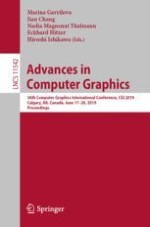2019 | OriginalPaper | Buchkapitel
Two-Layer Feature Selection Algorithm for Recognizing Human Emotions from 3D Motion Analysis
verfasst von : Ferdous Ahmed, Marina L. Gavrilova
Erschienen in: Advances in Computer Graphics
Aktivieren Sie unsere intelligente Suche, um passende Fachinhalte oder Patente zu finden.
Wählen Sie Textabschnitte aus um mit Künstlicher Intelligenz passenden Patente zu finden. powered by
Markieren Sie Textabschnitte, um KI-gestützt weitere passende Inhalte zu finden. powered by
